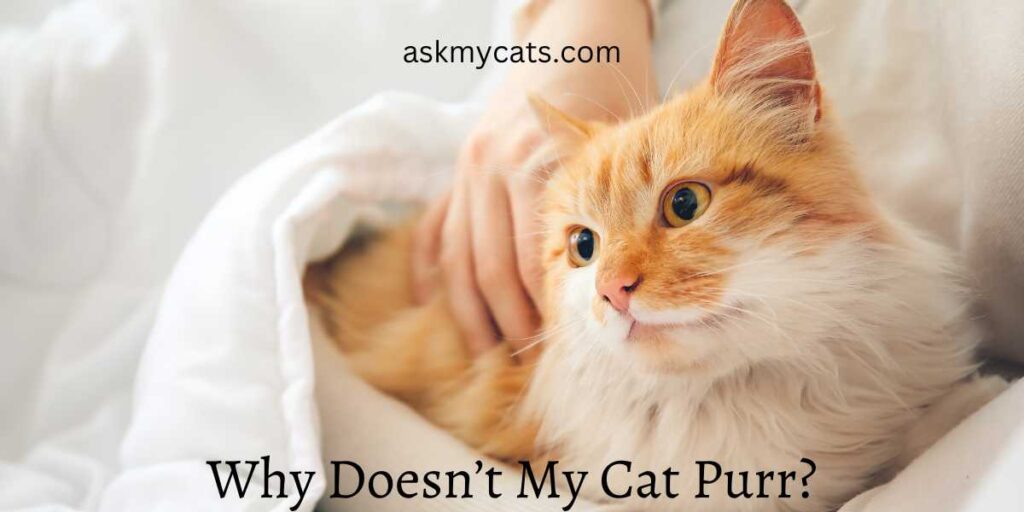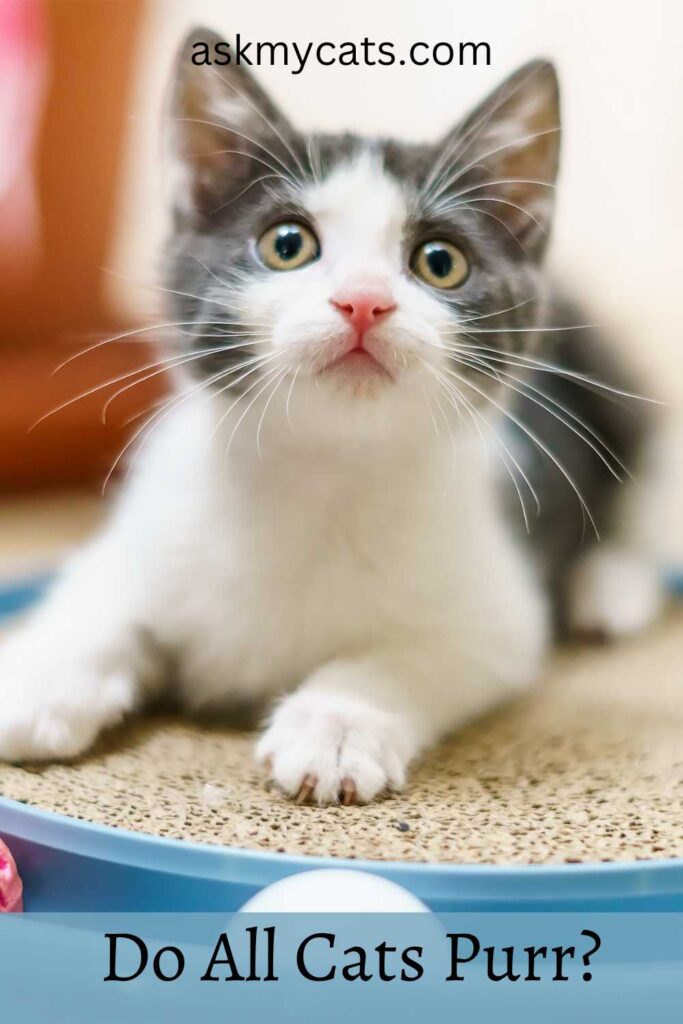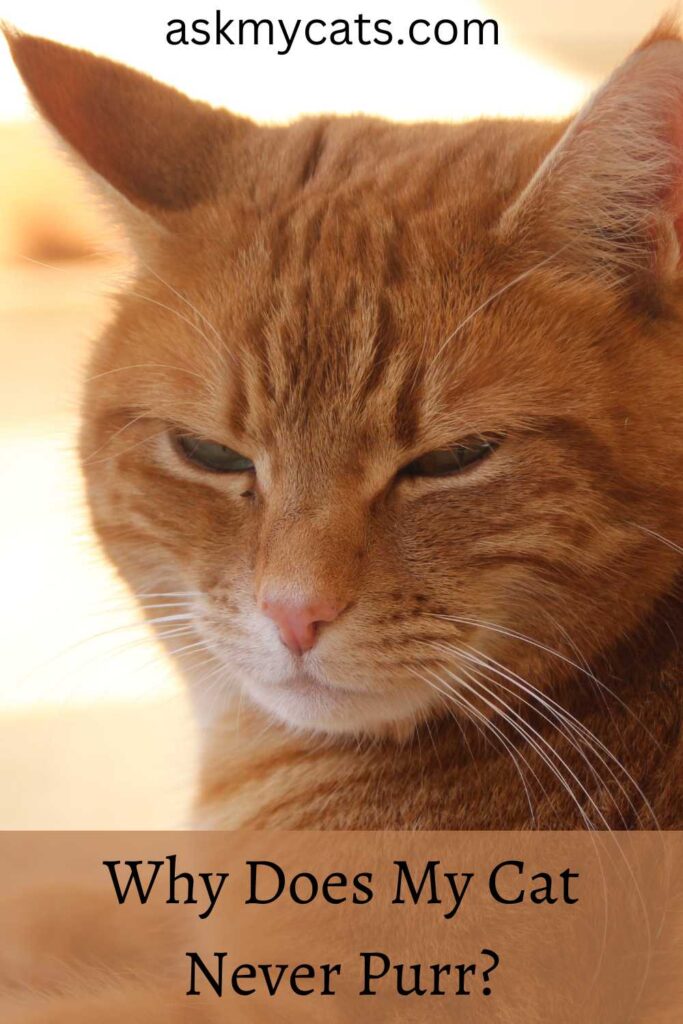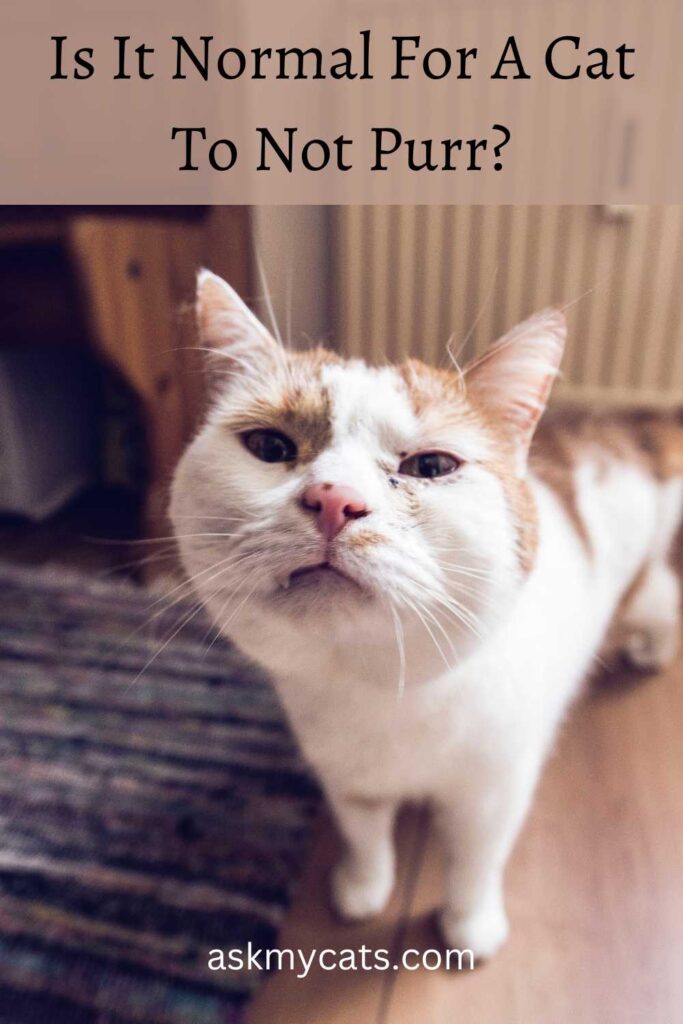Purring is arguably the most raved vocal characteristic of cats for many cat owners. It is just the sweetest, adorable little rasp. The much-loved purr is also believed to have numerous healing properties and studies show that it could possibly lower stress in humans.
Thus, it is no wonder why you’re dejected that your cat just refuses to purr.
As you’ll read this article, you will get to know why some cats don’t purr and how might you possibly elicit a pleasing purr from your kitten.
Key Takeaways
- Purring is a vocal characteristic exhibited by many cats and is believed to have numerous healing properties.
- Studies have shown that it can lower stress in humans.
- Not all cats purr. Some small and medium-sized cat species are known to purr, while larger cats such as lions and cheetahs are sometimes thought to make a similar sound.
- Cats may not purr for a number of reasons, including their communication style, origins, or due to stress or anxiety. A damaged vocal cord or other medical condition can also prevent a cat from purring.


Give Your Cat the Perfect Day
Get the Free Ebook!
Do All Cats Purr?
No, while purring is common in most cats, there are certain species of big cats that simply don’t purr. In all likelihood, they roar instead.

Cat veterinarians have been exploring and researching the curious rasp of a cat’s purring for decades.
Although there has been some significant headway in the field, there are a lot of questions that still remain enveloped in ambiguity. One of them being whether all cats purr or not.
In the 19th century, it was thought that a ‘purr’ and a ‘roar’ were separate phenomena exclusive of the other.
Cats, therefore, could be distinguished into two groups: those who purr i.e small cats(felines), and those who don’t i.e big cats(pantherines).
However, this theory was debunked by a 2002 study, wherein, a significant number of big cat species like lions and cheetahs could also be found purring.
Critics of the research argued that the sound that these big cats made could not be called “true” purrs. Therefore, this study’s results were inconclusive and still clouded in speculation.
The consensus among contemporary vets seems to establish the fact that ‘true’ purring is exhibited only by the Felidae family of cats, which consists of small cats and Viverridae(medium-sized mammals)
Marjan Debevere, who is studying for a degree in feline psychology, and was interviewed by BBC Future says, “All cats are different, some never purr and some will purr constantly.”
Thus proving that not all cats purr.
Why Does My Cat Never Purr?
Every cat has its own idiosyncratic behavioral qualities. One cat might purr constantly throughout the day, while the other may be very quiet and not purr at all.
Cats all have different volumes of purring, which vary drastically. If your cat used to purr consistently in the past and stopped suddenly, it might be due to a medical condition. You should promptly consult a vet in such a scenario.
Here are some other reasons why your cat might not be purring:

1. Communication Style
Purring is a medium through which cats communicate with their mothers, siblings, or human caregivers. However, every cat is unique and we can’t expect all of them to express themselves in the same way.
Thus, if your cat doesn’t purr, it might just mean that she prefers a different communication style like through her body language, facial expressions, or just a plain old meow.
2. Origins
Some theorists believe that kittens born to feral cats don’t purr. This is because their mothers discouraged it on the grounds that purring attracts predators.
While this hypothesis might not be highly generalized, scientists do claim that feral kittens are quieter than domestic cats.
3. Damaged Vocal Cords
An injury to the larynx(voice box) will hinder your cat’s vocal vibrations since the larynx enables purring in cats.
Common injuries to the voice box include cancer, trauma, or an abscess. They can also be caused by neurological disorders such as autoimmune disease, muscle disorders, and hereditary paralysis.
Fortunately, voice box diseases can be treated without any undue complications.
4. Stress or Anxiety
Cats under excessive anxiety or duress tend to go silent. If you have recently brought home a new kitten, then she may be too scared in a new environment and not feel comfortable enough to start purring.
Not purring can be a sign of unhappiness in some cats, and you should definitely take your kitten to the vet to prevent further aggravation of the situation.
5. Older Cats
In general, older cats tend to be much more gentle and calmer than young ones. Thus, they might gradually start purring at a very low pitch or even stop constantly.
Must Read: Cat Purring Effect On Humans: The Power of Cat Purring
Is It Normal For A Cat To Not Purr?

While purring is a common vocal feature in most domestic cats, there is no reason to be alarmed if your cat doesn’t purr.
Every cat is different, and not purring could be related to your kitten’s physiology. Some cats can have a vocal cord or respiratory issue which inhibits them from purring.
Thus, it is not completely unusual for a cat to not purr
However, if your cat was a regular purrer and stopped suddenly, it could be due to a medical issue and you should consult a local vet in such a scenario.
There are some disorders like laryngeal paralysis which causes a gradual loss of purring in cats.
Is Not Purring A Sign Of Feline Unhappiness?
Not purring isn’t always a sign of unhappiness in felines. Purring is primarily a means of communication. Some cats prefer to communicate in other ways than purring like roaring or meowing.
Thus, a non-purring cat isn’t necessarily experiencing any pain, discomfort or unhappiness due to an absence of purring.
If purring cats stop purring, then that could signify a number of different things( refer to the list given above.), even unhappiness or stress. Observe your cat’s behavior carefully to determine the cause of not purring.
Interesting Read: Why Does My Cat Lay On Me And Purr?
What To Do When Your Cat Stops Purring?
It can be challenging to induce a non-purring cat to purr. However, you can take certain steps to create a more purring-conducive environment for your kitten.
1. Cuddles
Cats are champion cuddlers and there’s nothing that can replicate the wonderful feeling of snuggling close to your kitten.
Cats highly enjoy warm surroundings and comforting touches from their owners. You can try softly petting your kitten or gently scratching her behind the ears to elicit a rasp of contentment from her.
2. Create a warm space
Cats don’t handle the cold too well so ensure that you are tucking your kitten in a warm and cozy space. You can wrap her in soft, fuzzy blankets and towels to make her feel extra comfortable.
3. Talk Gently
While kittens don’t understand our language, they still like it when you talk to them. You can make soft, purring noises and mimic purring noises to elicit purrs from your kitten.
4. Reduce Stress
Stress is a big factor that could be inducing not-purring in your kitten, so ensure that you try to make your kitten’s surroundings as stress-free as possible. You can do this by spending time with her, frequently playing, taking her out in nature, or introducing cat puzzles or games.
Some of the Interesting reads regarding cat purring:
- Why Do Cats Purr? The Science of Cat Purring
- How To Make A Cat Purr?
- Do Cats Purr When Stressed?
- Why Do Cats Purr When They Are Dying?
- Do Cats Purr When They Sleep?
- Why Does My Cat Purr When He Sees Me?
- Why Is My Cat Purring So Much?
- Why Does My Cat Purr So Loudly?
- Why Do Cats Purr When You Stroke Them?
- Can Cats Control Their Purring?
- Do Cats Purr When They Are Happy?
- Do Cats Breathe Faster When Purring?
- Why Does My Cat’s Purring Sound Congested?
- Why Do Cats Purr When You Talk To Them?
- Differences In Purring Between Cat Breeds
- Why Do Cats Wag Their Tails While Purring?
- How To Purr Like A Cat?
- Why Is My Pregnant Cat Purring So Much?
- Why Do Cat’s Noses Get Wet When They Purr?
- Why Do Cats Purr And Knead?
- Do Cats Purr When They Are Sick Or In Pain?
- Do Feral Cats Purr?
Frequently Asked Questions
Why is my cat purring in her sleep?
Cats purring in their sleep is similar to humans sleep-talking. It is merely a response to the events taking place in our dreams. If your cat is having a good dream, then the purring could suggest joy, while if she is having a nightmare, then it would reflect duress.
Why does my cat purr so much?
If your cat is purring constantly, then that might just be a sign of positive communication and a state of satisfaction and happiness. Kittens usually purr throughout the day while they are nursing. Thus, it isn’t a cause for concern.
Final Thoughts
In a nutshell, your cat could be not purring due to a multitude of reasons. Some cats are simply not from a purring species, others have feral origins, while yet others prefer different forms of communication instead of purring.
However, if your cat used to be a regular purrer and stopped suddenly, the potential cause could be unhappiness or a medical condition such as illness, stress, or injury. You must consult a vet to rule out the probability of a serious ailment.
Rest assured, it is completely normal for a cat not to purr and you need not needlessly worry about it.
Interesting Read: Why Does My Cat Drool When He Purrs?
Interesting Read: Why Does My Cat Purr And Bite Me?
